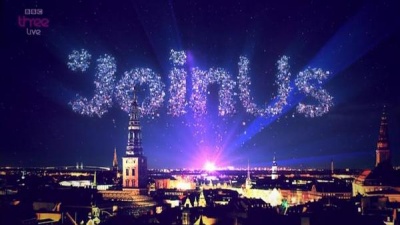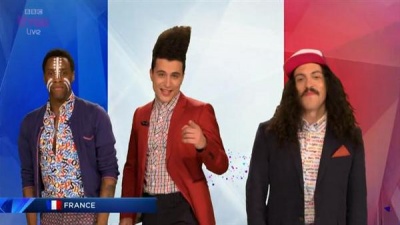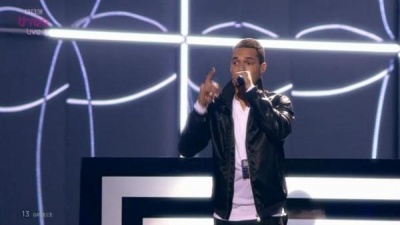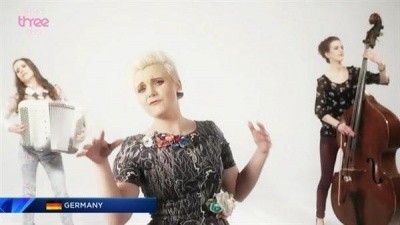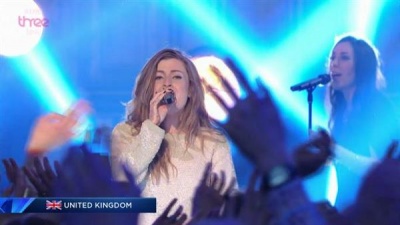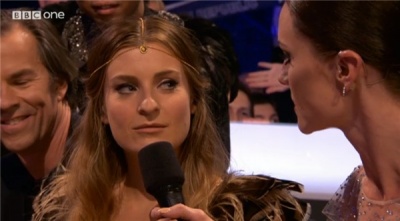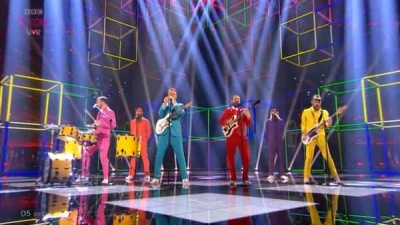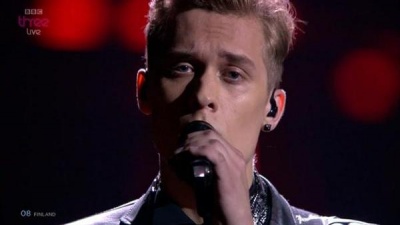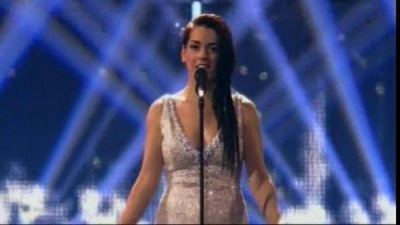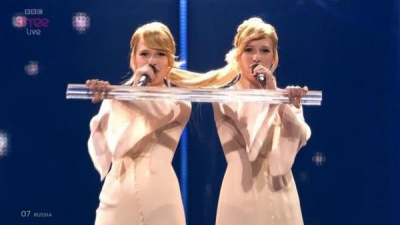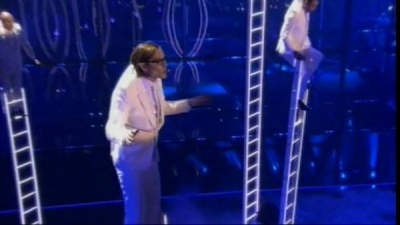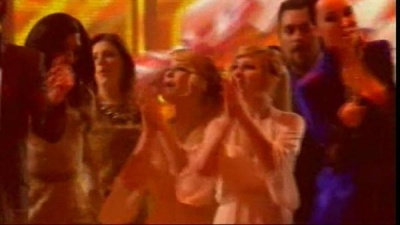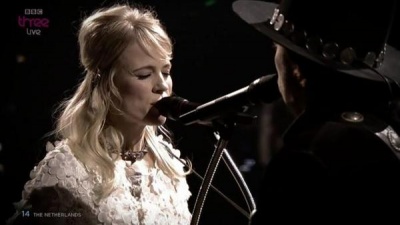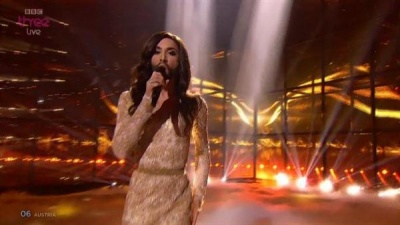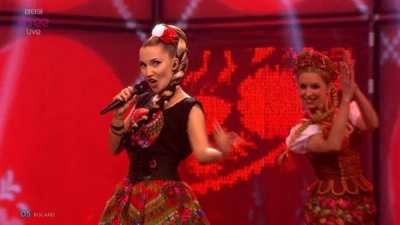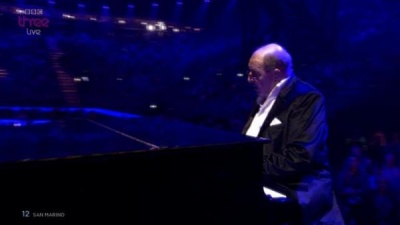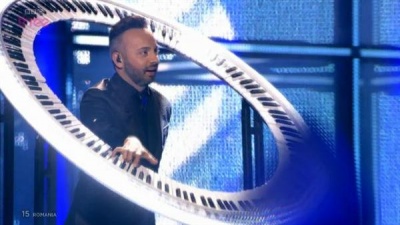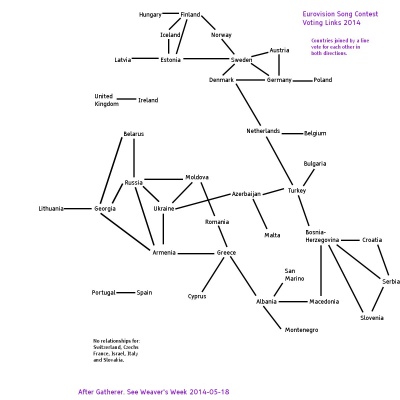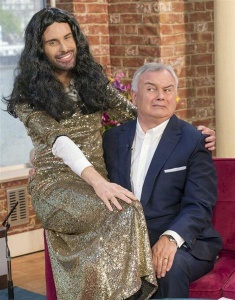Weaver's Week 2014-05-18
Last Week | Weaver's Week Index | Next Week
- "Let's do away with prejudice, inside we're the same"
- "You are my guiding light, my shoulder, my shelter, my satellite"
- "Live like you'll never stop, take this chance and give it everything you've got"
- "I'd be fearless, I'd jump as far as I can see, and beat the perfect storm"
- "Telling all the world to show some love, no-one's gonna bring me down"
- "We'll rise up and try again, don't you know?"
- "We're shining like diamonds with love in our hearts"
Contents |
Eurovision Song Contest 2014
DR for BBC, RTE, and other EBU members
Grand final, 10 May
This column expands upon some of the points we made on last week's episode of the Fifty 50 Show, clarifies some matters, and adds in commentary from actually looking at the voting for more than ten seconds.
At the bottom, one of the Big Five, but not the one many commentators expected. France3's entry, "Moustache", performed by Twin Twin, was a mess of influences, a riot of colour and sound and moustaches on the backdrop. It left us cold. It left the viewers and juries cold, scoring single points from Finland and Sweden. The big singing show in that country last Saturday was the final of The Voice of Holland of France, which got about three times as many viewers as the Eurovision Song Contest.
Two more entries finished in the bottom tier: RTVSLO got 9 points for "Round and round", and SMRTV picked up 14 for "Maybe". Both broadcasters narrowly qualified for Saturday, and making the final was about as much as they could expect. The Slovenian entry apparently botched up the jury final; the San Marino entry was lucky to be there.
A big leap to PBS of Malta, "Firelight" scored 32 marks, a gorgeous staging of an unsubtle song; in retrospect, it left us feeling a little manipulated. "Start a fire" finished next to "Firelight", 33 points is by far the worst performance for Íctimai, and this column still reckons it's far better than that. We have worked out why we like it: "may the slightest light start a fire" is the best Hunger Games fanfic, far preferable to Suzanne Collins' limp efforts.
Also on 33 points was the RAI entry, "La mia città" performed by Emma. The broadcaster from Italy had chosen the performer and let her submit a song from her new album "Rocce e Melato". The comparisons with Bonnie Tyler don't end there, it was a loud and raucous performance that didn't disgrace or threaten the left-hand side of the scoreboard.
Into the top 20 with Not!ERT's "Rise up". A good rap from RiskyKidd (known to his mother in Hackney as "Shane"), a gimmick of people bouncing on a trampoline, and a performance that was loud and mucky and the warm-up for the eventual winner. The diaspora televote did their best, but couldn't advance beyond 35 points. (We're sure it's a coincidence that RiskyKidd's opening rap uses exactly the same rhythm and rhyme scheme as Eliaza's entry.) RTCG won the battle of the Eastern ballads, "Moj svijet" took 37 points and 19th place; we hoped for better and that Montenegro will join us again next year.
For most of the Big Five, 18th place and 39 points would be a disappointment. Not so for NDR; "Is it right" was expected to leave Germany rock bottom of the board. The song was performed by Elaiza, three women playing in a modern style, derivative of the traditional oom-pah band. For Elaiza, the prize was simply being there: they'd entered NDR's wildcard round, one of 2500 songs to do this. Various off-screen rounds gave them a spot on the television programme, and then into the national final, and the superfinal.
Shorn of this backstory, and without the motivated fanbase to propel them, Elaiza could have got lost. It's credit to a simple song, performed well, that they turned in a decent performance. The staging included a ticker-tape parade; in rehearsals, this misfired and the accordionist had to be carried off the set because she couldn't move her feet. Why? That's Eurovision for you. (Graham Norton's attempt at a catchphrase, there.)
And so we come to the BBC. 40 points and 17th place for "Children of the universe" performed by Molly, and there's actually a sense that this is quite disappointing. There was a short moment after the first rehearsal when fans reckoned the BBC could be a contender, just as there was a short moment in the 2010 voting when "In a moment like this" looked like winning for Chanée and N'evergreen. Both these moments passed.
What went wrong? Primarily, but not exclusively, the performance on Saturday: the backing singers came in a little too low, dragged Molly down with them, and that meant she struggled to hit a tune in the chorus. This wasn't an obvious failure a la Jemini in 2003, and it's credit to the BBC's crew that they managed to rescue the performance.
We can criticise the staging – the ethnic-hippie look reminded us of Joan Franka, the TROS entry from 2012 who pretended to be a Native American and fell short. On the other hand, Fire Curtain of Victory, as used by winners DR and Íctimai in recent years.
We can criticise the song: even when sung in tune, the opening is particularly complex, and it resolves into two refrains competing with each other ("Power to the people" from the backing singers, "Children of the universe" from Molly). People only half-listening can come away with the inaccurate impression that it's a messy song. It's really difficult to merge two songs into one – listen to the last chorus of "Three lions" for a lesson in how to do it. Molly's song isn't that good, and requires some work from the listener.
And "some work from the listener" isn't going to happen. Eurovision is long. Really long. There are 26 entries to consider, almost two hours of varied performances. The viewer may be dizzied out, or have made up their mind, by the end. The BBC's entry was performed in position 26, a slot from which no-one has ever done well.
We get what DR has tried to do with the running orders this year: attractive openers, strong closers, balancing between fast and slow songs. Performances were drawn into first half or second half, and in the first half of the final, there were a lot of upbeat songs; that's the luck of the draw. Songs from broadcasters in the east of Europe gravitated towards the start of each half, and those from the west towards the end; that's deliberate by DR, and not terribly sporting. Next year's organisers might wish to consider pots of about 6 entries: a quarter of the final, a third of the semi-final.
Anyway. Good but not outstanding song, done no favours by the draw and hurt by an imperfect performance. Molly oozed confidence throughout this process, she will have learned a lot, and we both hope and expect that the BBC won't be abandoning her as "loser". She's been a good ambassador for BBC Introducing, both by publicising the public service work and by showing how the Beeb makes a prize available. It might encourage other acts to participate.
We hope that the BBC has a plan to ensure quality, similar to DR's plan. (2008-9: raise expectations by qualifying for Saturday and finishing midtable. 2010-13: make a serious effort to win. 2014: host.) It's likely to be a five-year plan, and this was year one. So much done, so much to do.
Cracking on, BRTC finished 16th with "Cheesecake". There's a gap from Belarus to Iceland, from the Fourth Division to the Third Division songs, from 43 points to the 58 of RÚV's "No prejudice". TVP twisted arms to get "My slowanie" into the contest: the performance of heaving bosoms was derided by the BBC jurors, who put it last. The televoters and the Polish diaspora wanted to see it again, putting it first. Under the current voting system, last plus first equals zero point. Under the system in place a couple of years back, last plus first would have equalled seven points. More voting geekery later.
"A song that can score two, three points across the board will do very well," is a meme that does the rounds in Eurovision fans. SSR and SRG's entrant "Hunter of stars" tried this approach, and finished 13th with 64 marks. Sixteen national juries sent something, only three sent more than five marks. The BBC would have liked as much success as Switzerland, and perhaps came within an ace of getting it. TVR's "Miracle" didn't come off, 12th place and 72 points; maybe next year for Romania.
YLE sent "Something better", also 72 points and 11th place. Softengine were big winners from this contest. The band visibly grew in confidence as the fortnight went on – Topi sang the opening line on Thursday with eyes closed, by Saturday he was gazing down the camera. We expect the sports departments across Europe will be adapting this for their various montages and packages. We know Finland's treated them as heroes.
Into the top ten, with "Dancing in the rain" for TVE. Every decent commentator across Europe made the joke "The rain in Spain falls mainly on the stage," which explains why neither Ken Bruce nor Graham Norton went down that road. It's a classy ballad, properly belted out by Ruth Lorenzo. Proper belting, in the technical sense, requires the performer to remain stationary, and that was the attraction of the performance. So strong were her vocals in the dress rehearsal that Ruth literally blew out the speakers in the press centre.
DR finished ninth, the top of the automatic qualifiers. "Cliché love song" was the latest in a long line of self-referential songs, stretching back through "Something better", "Amazing", Dermot and Dave's contribution, "Title of the song", Tony Hawks' "This is the chorus", "Meaningless songs (in very high voices)". This entry was an upbeat love song, entirely devoid of novelty, utterly predictable, and no less fun for it.
These songs both made 74 points. There's a jump to the songs in the Second Division, beginning with NRK's "Silent storm". This was a deeply conservative song, big man over-emoting in a way calculated to impress the juries – but Espen risked turning off the public. This is exactly what happened, fifteenth amongst the public televotes. Note also how the audience was asked to hold up their mobile phones in torch mode: this forces them to put down their flags, and helps give clear camera lines to the stage.
If this year's theme was of tolerance and inclusivity, no-one bothered to tell the audience in Copenhagen. Yes, the government behind RTR has been acting beyond the pale (invading bits of other countries isn't on). Yes, there are questions about whether the Russian broadcaster still serves its minority viewers in a manner consistent with the EBU charter. So how come the Tolmachevy Sisters were jeered and booed at every opportunity: when entering the stage, when leaving the stage, whenever a national jury dared to give them votes? "Shine" was an adequate song, well performed; 89 points was about right, and this year earned 7th place.
NTU, or at least those bits still receiving broadcasts from Kyiv, finished sixth, breaking to 113 points. "Tick-tock" had an interesting gimmick, the man on the hamster wheel, and was polished to within a quaver of its life. Only ten of the douze points were awarded outside the top four songs, and none of them to the Ukraine entry. There were two top marks for entries from Montenegro and Russia, and one apiece for Azerbaijan, Belarus, Italy, Romania, Spain, and for MTV from Hungary. "Running" sparked controversy in the English-speaking world for its lyrical content, domestic abuse isn't what we expect to find on a Saturday night light entertainment show. No, it's what we'd expect to find on Casualty. 143 points.
The UK's National Domestic Violence helpline is 0808 2000 247
Before the top flight, some notes on the interval entertainment. On second viewing, we enjoyed "Ode To Joy Performed By People On Massive Light-Up Ladders", once the wackiness had gone away it's a lovely piece. "Twelve Points" was a comedy song performed by the hosts, closing a running joke about the show being seen in China. That was funny once; funny not at all was "The Museum of Eurovision". The "Here's some food for the contestants" bit was unsettlingly creepy as the host told Molly all about the Smitten-Downes. Graham Norton being blasted by a paper streamer would have been better if it had been a custard pie. Our favourite bit was "Rainmaker", Emmelie de Forest's section, explaining just why there was a water feature at the side of the stage, and ending with all of the competitors rushing the stage.
The First Division of Eurosong was anchored by AMPTV, with a score of 174. SVT finished third on 218 points. Both of these songs had been bookmakers' favourites earlier in the year, thanks to the Armenian diaspora and the Swedish fans backing their prejudices. Both songs have considerable merit, both have problems – Sweden's public went for "Undo", another conservative choice. Armenia's broadcaster chose "Not alone", a song perhaps too modern and contemporary. Both were the favourites of three national panels. We hear that Eliaza from NDR presented Aram MP3 with a promotional record, as in a round black disk with a hole in the middle. To hear the content, he had to ask his grandfather, Lusine Vynil.
Second place for AVROTROS's entry "Calm after the storm". Americana and country is a very unconventional choice, part of the reason the Eurovision Song Contest was founded came as a reaction against the "foreign" musics brought over by American forces stationed across Europe in the early 1950s. There's very little more American than country, and we think this is the first song in the style since Texas Lightning in 2009.
The song is almost a pastiche of "he and she get into a fight and reflect on it afterwards" genre, country music experts could name a dozen recent songs that do this sort of thing better. But country music experts in Europe are almost as rare as televoters for Azerbaijan in Yerevan, and this song – reflective, contemplative, subtle – clearly hit a chord. Top marks from eight panels, and it's been the breakout sales hit of the contest, making the top five on the UK's commercial radio chart and thoroughly confuzzling Marvin From The Jls. For that alone, they win.
Linking "Not alone", "Calm after the storm", and ÖRF's winning song "Rise like a phoenix" is one fact: the national public didn't vote for any of them. All were internally selected, both performer and song, by the broadcasters. This annoys libertarians like Fraser Nelson of The Spectator, who groused that the BBC would do better if it let the public choose the song. The defence of internal selections is that it encourages big names to participate, it encourages a great song, and that it shapes the public opinion of the contest. After many years of picking songs in the "Ding-a-dong" mould, the Dutch people have now had three years of reflective, calm songs, and they've enjoyed success.
The BBC hasn't quite got the hang of this internal selection, choosing one horribly outdated song and getting three big name acts to send an album track. We agree that it would be good for the public to choose the BBC's entry, but the British public needs to have a selection of solid songs. No duffers ("Even if", 2008), no gimmick performers (Katie Price, 2005), and no Wogan-era nonsense ("Flying the flag (upside down)", 2007). A one-shot final between quality songs is fine; if the BBC can't find enough quality songs, just select internally.
The winning song was sung by Conchita Wurst, a long-haired full-bearded lady. She sings a somewhat overwrought song that wouldn't be out of place on a Céline Dion album, and she sings it just as well as Céline. The visual shock of "long-haired full-bearded lady" was left as late in the performance as it could be, something like 40 seconds into the performance, by which time the audience was enjoying the song. A clear winner in the televote, with 13 maximum scores from the panels. "Rise like a phoenix" also won the jury final, and it looks like the voting order was arranged to leave ÖRF's best panels late, hoping that SVT or AVROTROS remained in contention.
We know that Conchita first performed on an Austrian talent show a few years back, performing "My heart will go on". We're not sure how much of Conchita is an act in the Paul O'Grady style, and how much is a performer presenting in an unusual gender configuration. Assuming the latter, we're left wondering where the story is. It's sixteen years since Dana International won this contest, ten years since Davina pretended Nadia had "a big secret", two years since Luke had a mildly interesting story. Being a trans competitor on a game show isn't a big deal, and this column chooses not to make it a big deal.
On the other hand, there is still prejudice against people who don't conform to the gender stereotypes. There are people who are prejudiced against people who are not entirely heterosexual. Dale Maily works as satire only because it's very close to the truth.
Was this year a triumph for political voting? Conchita said before the contest that she competed to puncture prejudice and homophobia. How many people voted for the performer, not the song? How many people voted into what they wanted the performer to symbolise? How many people voted against "Shine" because it came from a repressive regime, and not because it was an OK song? Or formed opinion on songs because they were associated with non-democracies / democracies / the wrong sort of politics / the right sort of politics?
In an ideal world, the best song wins at Eurovision, and that might have happened this year. In an ideal world, the best song wins because it is the best song, and we have just a scent that that might not have happened. We hope to be proven wrong.
The Annual Eurovision Song Contest Voting Geekery Bit
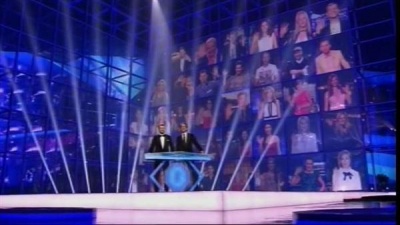 Next week: the Eurovision Celebrity Squares Contest.
Next week: the Eurovision Celebrity Squares Contest.
The main thrust of discussion this year has two points. The UK televote quite clearly showed massive support for much closer integration with Poland. Old man in a blazer, here's what you will be missing! The televote put TVP's entry in first place. The jury ranking put it in last place. Under this year's rules, that accumulated 26 ranking points, and it was 11th in the UK panel's rankings, so scored zero points. (An aside: this could be a complaint to 0898-regulator ICSTIS, as the BBC would have known that votes for Poland could not affect the result. Doubt it would succeed.)
But this isn't the only way to rank the songs. Two years ago, only the top ten in the jury and televote rankings were considered, with bonus marks for finishing in the top two. Under these rules, the entry from the Poles would have scored 12 positive points from the televote, and 25th place from the jury would have been indistinguishable from 11th. The overall panel mark translated to 7 points on the master scoreboard.
We can repeat this exercise for other songs, and for all other national panels. Comparing the actual 2014 result to a result compiled under the 2012 rules shows that Conchita Wurst is a slightly more runaway winner, extending her lead from 52 to 64 points. The gainers are songs from Russia, Poland, Azerbaijan, and Malta, all of them popular in the televote but rejected by some national juries. Losers are the jury favourites from Norway, Spain, and Denmark.
But we can repeat this for the semi-finals as well. There isn't a major change at the top – the top two both win their semi-finals. At the bottom, San Marino's entry fails to qualify – in the real world, it qualified by a point; in the 2012 system, TVP qualify by four points, allowing Portugal to bask in the Saturday glow. This is a really difficult one to call – 9 of the various national panels preferred the Portugese entry, 7 went for San Marino. The crucial difference was that juries that disliked Portugal really disliked it – six juries put it 14th or 15th, while three juries loved San Marino and put it in their top 5.
The main requirements of a voting system are that it is fair, and that it is seen to be fair. The EBU goes to great lengths to ensure that the current system is fully fair and completely above board – there's an independent scrutineer for the televotes, and a notary for the jury votes. They're quite prepared to discard jury results that appear suspicious, as the panel from Georgia found out this year.
Does it appear to be fair? Not when the most popular song amongst the British televoters translates into no panel points.
As we've discussed in the past, fairness requires as much information to be considered, and it's reasonable to consider all the places, both the top and the bottom. One possibility is to alter the rankings slightly – one penalty point for the most popular song, to 10 for the 10th most popular. Then award half-marks: the 11th song gets 10.5 penalty points, the 12th gets 11, and so on until the 25th song gets 17.5 penalty points.
From this change, the jury favourite and the public favourite are guaranteed to score something, but not much – the UK vote for Poland would have been 2 points. The overall scoreboard stays about the same – only one Saturday song varies by more than 10 points, and the average change is about 4 points. And it doesn't have much effect on the semi-finals, altering scores only slightly – but still enough to send Portugal through and San Marino home.
Now that we have a full ranking of each juror's ballot, and a full ranking of each national televote, we can combine them as a single transferable vote. From the semi-final, ten are to be elected, and Tuesday's result is a surprise: San Marino don't qualify, but neither do Portugal; instead, Albania gets the tenth spot. None of the other rankings we've discussed can lift Albania above 15th, but it did sufficiently well with the jurors – two-thirds of them put "One night's anger" in a qualifying spot – to overcome a universally poor televote.
There are no changes to the Thursday semi-final. The Saturday final is still won by Austria from the Netherlands, with Armenia passing Sweden for third place.
The public is also able to vote by putting down 99 cent and buying an MP3 of their favourite Eurovision track. Though it lost the contest, "Calm after the storm" captured the public purse, leading in the major nations across the continent. "Rise like a phoenix" and "Undo" also sold well, with "Cliché love song", "Is it right" and "Children of the universe" picking up better sales than they had televotes. Curiously, the British public didn't buy "My Slowanie" in any great quantities, it barely made the 20th most popular download.
And that's it — what? The map? How could we forget the map! It notes significant vote flows between national panels in both directions. So the UK and Ireland are linked because they vote for each other, but Ireland's love for Denmark is not reciprocated, so there's no link. Azerbaijan suffers from a weak year, breaking its marginal links to Romania, Greece, and Russia.
Germany is finally working out its friends in the contest, establishing flows to Poland and Austria; Austria also get a flow with Sweden. Finland's good year allows them to re-create links with Norway, Hungary, and Estonia, while the dormant link between Estonia and Latvia is back after two years.
Have relationships between Georgia and Russia normalised a little? The two countries are sending each other votes once more. Armenia adds links to Greece and Ukraine. Most of the continent is connected on a bridge from Denmark to Netherlands to Turkey; the nations on the Baltic (plus Austria, but not Lithuania) cluster near Denmark, while Turkey's side splits into a former-Yugoslav clump, and an ex-USSR group with no clear leader.
So, while we ponder on how to get from Latvia to Lithuania via a chain of nine intermediate national panels, the stars of the show have got on with their lives. Already, Conchita Wurst has embarked on a tour of television studios, meeting the great and the good.
This Week and Next
We opened this week's column with lyrics from Eurovision Song Contest entries. They were, in order, from "No prejudice", "Mother", "Dancing in the rain", "Amazing", "Shine", "Heartbeat", and "Children of the universe".
Drinking in the second chance saloon on Only Connect were the Relatives and the Exhibitionists. Both of these sides lost in the opening round, and must win here to remain in the contest. Losers will be on the first train to Newport (South Wales), winners come back late next month. Connections was a good round for the Relatives, pinching a few bonuses, including on a spectacularly wonderful picture round. They took an 8-2 lead into Sequences, and needed it – the Exhibitionists clawed back thanks to a lovely picture round of their own, though quite how both sides missed the obligatory Gossip Girl reference we don't know. Blair Waldorf? ITV2 show that isn't The Only Juice is Fake? Evidently not.
A bonus on the final round let the Relatives go into the Walls ahead by 9-6. They took Wall 438, Coldplay Sings The Blues, and spend a long time thinking about the final link. Ah, but they've got one of the earlier ones wrong, and emerge with just four points. The Exhibitionists get Wall 439, the Cricket Wall, at least half the wall is terms in the beautiful game, and the team spends a good minute playing with those. And once they've got another group, they waste more time on the cricket. Four points, so it's 13-10 into Missing Vowels. It's a good round for the Relatives, who sweep "Slang terms for a wife" and nearly take "Things considered unlucky" to emerge victorious, 21-15.
BARB ratings in the week to 4 May.
- Britain's Got Talent is back on top, with 8.6m viewers.
- Masterchef and HIGNFY both have just over 5m, with Pointless Celebrities just under 4m, and Big Star's Little Star stable at 3.45m.
- Amazing Greys continues to fall, just 2.4m this week and not so far ahead of The Big Allotment Challenge (1.93m).
- Celebrity Juice (1.5m) and Britain's Got More Talent (1.37m) continue to prosper, while new Only Connect on BBC4 (895,000) remains ahead of new Come Dine on Channel 4 (820,000).
- The Chase going off ITV is good news for its repeats on Challenge (183,000), but they're still beaten by Splatalot (265,000 on CBBC).
Who would win the battle: Mark Labbett versus Dick and Dom? Depends whether it's a home or away fixture.
Next week's Week celebrates the career of an amazing quizzer. Before then, a new series of Four Rooms has crept up on us (C4, 7pm Sun). New runs for two of Radio 4's longest-running shows, Round Britain Quiz (3pm Mon) and Just a Minute (6.30 Mon). David Coleman gets a tribute evening, including a classic edition of A Question of Sport (BBC1, Wednesday). No Britain's Got Talent next Saturday, the auditions show moves to Sunday before the live shows begin on Monday.
Photo credits: DR, France3, NDR, BBC, ITV Studios / Eamonn Holmes.
To have Weaver's Week emailed to you on publication day, receive our exclusive TV roundup of the game shows in the week ahead, and chat to other ukgameshows.com readers, sign up to our Yahoo! Group.

